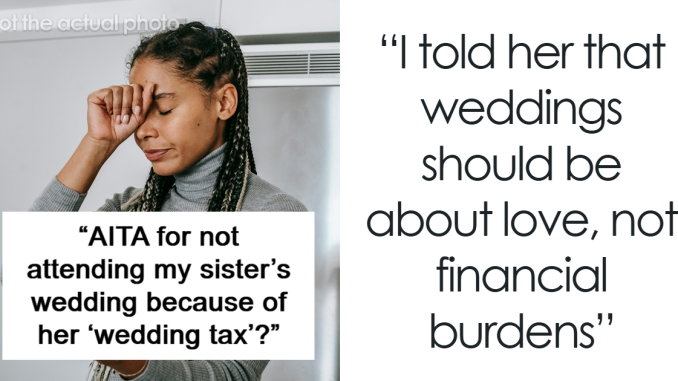
Weddings can be a pricey affair. While the costs vary based on a bunch of factors, research puts the average cost of an American wedding at $33,000 in 2024. But some lavish ceremonies can set you back thousands more. Back in the day, it was a tradition for the bride’s family to cover the costs. Recently, more and more couples are choosing to foot the bill themselves. Or at least contribute to some of the expenses.
It’s unusual for a couple to expect guests to pay for their wedding, but that’s exactly what one bride did. Her sibling shared that they were asked to pay a “wedding tax,” along with all the other guests. When they raised the issue, a massive fight ensued. And the sibling announced that they would no longer be attending. Now, they’re wondering if they took it a bit too far.
One bride turned her back on etiquette when she decided to impose a “wedding tax” that would see her guests funding her big day
Image credits: bristekjegor (not the actual image)
When her sibling questioned her decision, the bride simply told them to “chip in or don’t bother coming”
Image credits: namii9 (not the actual image)
Image credits: EyeEm (not the actual image)
Image credits: HeavyWolverine8706
Historically, the bride’s family would foot the bill for a wedding, because of an old tradition known as the “dowry”
The dowry custom dates back to the ancient Roman Empire and was a gesture from the bride’s family to offset her future living costs. Britannica defines a dowry as “the money, goods, or estate that a woman brings to her husband or his family in marriage.” The site further explains that a dowry is a “conditional” gift, meant to protect the bride against any possible future ill-treatment by her husband and his family. In the case of divorce or the death of the husband, the dowry would be returned to the wife and her family.
Over the years, the tradition evolved, with the bride’s family footing the wedding bill instead of handing over cash, goods, or property. Under this agreement, the groom’s family would sometimes be responsible for covering the bar tab, the honeymoon, and a few other expenses.
But as is the case with many things in life, that tradition has further evolved. “As couples modernize wedding planning and are getting married later after establishing careers, more of them are paying all—or a substantial portion—of the costs of their own weddings,” explained certified financial planner, Cynthia Meyer. “Who pays for what is more flexible.”
Image credits: freepik (not the actual image)
Experts advise couples to start saving early, and never to assume that someone else will foot the wedding bill
“Budget conversations should begin at the same time that guest list and venue discussions begin. If you are setting a budget, then set the budget,” advises wedding planner Alicia Fritz. “Don’t try and skimp on things that you know you are going to spend more on later.”
“My suggestion for engaged couples is to communicate early and discuss the details,” said financial coach Christian Stewart. “Don’t assume that anyone will pay for anything, even if they promised you something.”
Pink Book Weddings adds that, while you’ll likely have to dig deep, there is an upside to covering all of your own costs. “One great thing about this as an option is that you will be able to call all of the shots. You won’t feel pressured into anything if it is your own money that you are spending,” reads their site.
Image credits: dapor2560 (not the actual image)
The sibling did not end up attending the wedding but received several phone calls to say it had descended into chaos
If you, like us, were wondering how much the “wedding tax” was, the sibling later revealed that friends were expected to “donate” $50-$100 each, while the family was asked to give anywhere between $250 and $1000.
They also revealed that they chose not to go, but were inundated with phone calls and texts from family and friends. The wedding had turned into a circus. And the entire ordeal had become “a rollercoaster ride of emotions, sibling rivalry, and unexpected twists.”
It turned out the wedding wasn’t the only bill the bride expected friends and family to foot. In the comments section, it later emerged that the couple had also asked people to contribute to a “money fund for their house” two years before the wedding.
Image credits: user25451090 (not the actual image)
“I see this marriage ending in six months”: many netizens felt the bride was being totally unreasonable
Some felt the sibling should have paid the “wedding tax” as a gift
The sibling posted an update after the wedding, warning people to “buckle up” for the events that followed
Image credits: Jomkwan (not the actual image)
Image credits: X L (not the actual image)
Image credits: HeavyWolverine8706
The post Bride’s “Wedding Tax” Turns Big Day Into A Trainwreck Of Screaming, Fighting, And Refund Demands first appeared on Bored Panda.
